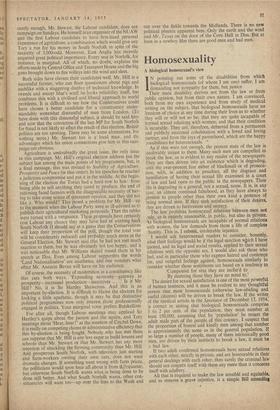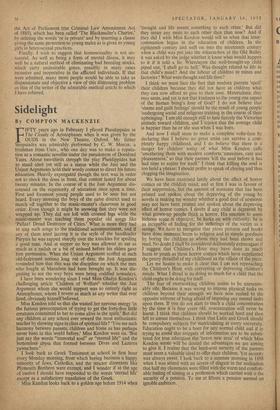Homosexuality
A biological homosexual's view IN pointing out some of the disabilities from which biological homosexuals (of whom I am one) suffer, I am demanding not sympathy for them, but justice. Their main disability derives not from the law or from public opinion, but from their own nature. I am convinced, both from my own experience and from study of medical writing on the subject, that biological homosexuals have no freedom of choice at any time during their lives as to whether they will or will not so be; that they are quite incapable of normal sexual relations with women; and that their condition is incurable. They are, therefore, debarred from a permanent And publicly esteemed cohabitation with a loved and loving partner, and from the joys of parenthood, which are the happy )ossibilities for heterosexuals. - As if this were not enough, the present state of the law is Intolerably unjust to them. Many such men are compelled to break the law, as is evident to any reader of the newspapers. They are then driven into an 'existence which is degrading, with, the ever-present fear either of blackmail or of prosecu- tion, with, in addition to penalties, all the disgrace and humiliation of having their sexual life examined in a court of law and laid open to the public in the newspapers. Their life is degrading in a general, not a scxuaj, sense. It is, in any ;:ase, an almost continual falsehood, as they have always to present to people other than their own kind a pretence of being normal men. If they seek satisfaction of their desk,* they are driven to furtiveness and secrecy. The law prdhibits homosexual relations between men not mly, as is entirely reasonable, in public, but also in private. As biological homosexuals are incapable 'of normal relations with women, the law demands from them a life of complete chastity. This is, 1 submit, intolerable injustice. I would ask heterosexual readers to consider, honestly, what their feelings would be if the legal sanction which I have quoted, and its legal and social results, applied to their sexual relations with the opposite sex. I would also ask those who feel, and in particular those who express hatred and contempt for, and vengeful feelings against, homosexuals similarly to consider whether those sentiments are based on a tendency to 'Compound for sins they are inclin'd to By damning those they have no mind to.'
The desire for sexual satisfaction is one of the most powerful of human instincts, and it must be evident to any thoughtful person that most homosexuals (otherwise law-abiding and useful citizens) will be driven to break the law. If the writer of the medical article in the Spectator of December 17, 1954, is correct in stating that biological homosexuals comprise 1 to 2 per cent. of the population, they must number at least 150,000, assuming that by 'population' he meant the adult male part of the people of this country. I suspect that the proportion of honest and kindly men among that number is approximately the same as in the general population. If so large a number of people, many of them intrinsically good men, are driven by their instincts to break a law, it must be a bad law.
If two adult confirmed homosexuals have sexual relations with each other, strictly in private, and are honourable in their general dealings with each other, then surely the criminal law should not concern itself with them any more than it concerns itself with adultery. . All that is required to make the law sensible and equitable. and to remove a grave injustice, is a simple Bill amending the Act of Parliament (the Criminal Law Amendment Act of 1885), which has been called 'The Blackmailer's Charter,' by deleting the words 'or in private' and by inserting a clause giving the same protection to young males as is given to young girls in heterosexual practices. Finally, I wish to suggest that homosexuality is not un- natural. As well as being a form of mental illness, it may well be a natural method of eliminating bad breeding stocks, which carry undesirable genes, possibly in many cases recessive and inoperative in the afflicted individuals. If that were admitted, many more people would be able to take as dispassionate and objective a view of this distressing problem as that of the writer of the admirable medical article to which I have referred.



































 Previous page
Previous page